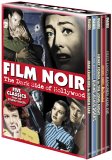| Reviews & Columns |
|
Reviews DVD TV on DVD Blu-ray 4K UHD International DVDs In Theaters Reviews by Studio Video Games Features Collector Series DVDs Easter Egg Database Interviews DVD Talk Radio Feature Articles Columns Anime Talk DVD Savant Horror DVDs The M.O.D. Squad Art House HD Talk Silent DVD
|
DVD Talk Forum |
|
|
| Resources |
|
DVD Price Search Customer Service #'s RCE Info Links |
|
Columns
|
|
|
Film Noir - The Dark Side of Hollywood
THE MOVIES:
"You know, there are only two kinds of animals that make war on their own kind: rats and men. And men are supposed to be able to think." -- from Anthony Mann's Railroaded
Kino has repackaged five of its older film noir discs in a new box and called it Film Noir - The Dark Side of Hollywood. Though now housed in slim plastic cases, the discs themselves are essentially the same as when they were released the first time. There are no new transfers from what I can see, no added bonus features. The main attraction of the box would then be the price point, which retails for $50 when the discs themselves still have an MSRP of $30. That would be about a 66% discount on each film.
Which is an exceptional deal for five movies of this quality. Unlike a lot of boxed sets, Kino has not thrown a couple of strong titles in with a few losers to lure buyers into taking some stinkers off their hands. The Dark Side of Hollywood goes five for five.
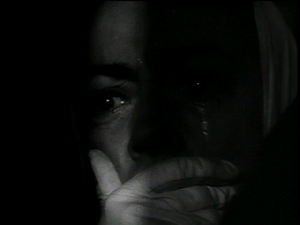
Sudden Fear
* Sudden Fear (110 minutes - 1952): Joan Crawford and Jack Palance both got Academy Award nominations for their performances in David Miller's Sudden Fear. Crawford plays Myra Hudson, a playwright who has taken little time to cultivate real-life counterparts to the romantic plots she crafts for the stage. After dismissing actor Lester Blaine (Palance) from her latest hit production for not being appropriately seductive, he proves her wrong by seducing and marrying her.
Only, Myra was right the first time. Lester is a heel, and he and his real girlfriend, Irene (Gloria Grahame, In a Lonely Place), are plotting to create a tragic exit for Myra and collect all of her Broadway money. It's a classic game of criss-cross when Myra uncovers the scheme and tries to beat Lester and Irene at their own game. Miller (Lonely are the Brave) has put together a nerve-wracking final act. He sets it up with an excellent montage in which Myra imagines every step of her counterattack where everything goes right, and with that as a reference point, it increases our anxiety when we see how badly it can go wrong. The action happens in the dead of night, providing plenty of opportunities for people to hide in darkened doorways and skulk around corners.
Jack Palance is a large man with chiseled features, and his presence is imposing. When Myra screws up his sure thing, he grows desperate, and that actually makes him scarier. There is also something to be said for how much more tension is created when the victim is appropriately scared. Crawford's large eyes and severe mouth are a blessing in such a situation, and her fright makes Palance's threat even more palpable.
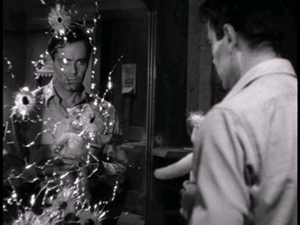
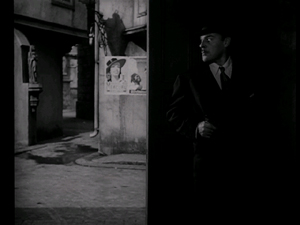
The Long Night; Hangmen Also Die
* The Long Night (97 min. - 1947): Henry Fonda stars in this remake of Marcel Carné's Le Jour se lève, directed by Anatole Litvak (The Snake Pit). The film opens with a bang: Joe Adams (Fonda) shooting a devilish character named Maximilian (a smarmy Vincent Price). Joe locks himself in his one-room apartment and refuses to come out, creating a stand-off between him and local police. Pretty soon, the entire town has come to watch, but Joe won't budge. He ruminates over what got him to this point, and through flashbacks we see his romance with the broken but sweet Jo Ann (a young Barbara Bel Geddes, from TV's "Dallas"), the temptation of the magician's assistant (Ann Dvorak, the 1938 Gangs of New York), and the man who stirs them all up, Maximilian, a two-bit illusionist who works with dogs and manipulates young women. Joe is driven crazy by jealousy and lies, ultimately ending up in the desperate position we met him in.
The Long Night is an excellent film. Litvak and screenwriter John Wexley (Angels With Dirty Faces) masterfully cut between present and past to keep the viewer guessing as to what will happen next. Jo Ann's motives are often unclear, and Fonda is especially good at capturing Joe's frustration. He's angry, but he doesn't know what to do about it. He may be even more unsure of what's going on than the audience. Price is also fantastic as the villain. Maximilian is a con man, but one that isn't nearly as good as he'd like to think. An actor as smart as Price understands this kind of hubris, and he can make Maximilian both evil and pathetic at the same time.
* Hangmen Also Die (134 min. - 1943): This Fritz Lang wartime thriller isn't really a film noir. It concerns itself with noble people, the Czechoslovakian underground who were trying to oust the Nazis from their homeland. Traditional film noir is about people with a questionable moral code who don't so much try to beat down the immoral society they are trapped in, but rather try to carve out a peaceful coexistence within it. Lang was one of the originators of the noir style, however, and so Hangmen Also Die nestles comfortably amongst the others thanks to the look the director gives it. Many trademark Lang elements are here, such as his love of the grotesque (town clocks with images of death for decoration, a Nazi officer trying to pop a visibly huge pimple) and flamboyant villainy (the Gestapo interrogators turn mincing and preening into devices of intimidation). There are skillfully composed shots of city streets viewed from high vantage points, and angular lighting that casts piercing shadows that point straight to the dark side of human nature.
The story for Hangmen Also Die was conceived by Lang and agitprop playwright Bertolt Brecht, and the screenplay was finished off by John Wexley, who also wrote The Long Night. It starts in the court of Reinhard Heydrich, a ruthless Nazi enforcer nicknamed the Hangman (played by Hans Heinrich von Twardowski, who made a career out of playing Nazi officers). Through cruelly bent pomp and circumstance, he forces the Czech officials to toady to his every whim. Thus, no one is sorry when a freedom fighter assassinates him. Dr. Franticek Svoboda (Brian Donlevy, The Great McGinty) quickly discovers that the only thing harder than killing the most sadistic guy in town is getting away with it. Martial law is imposed, and Svoboda is forced to rely on the help of Nasha (Anna Lee, Bedlam), a young woman who just happens to be standing on the wrong street corner at the wrong time. Her father (Walter Brennan, Rio Bravo) was an old-school revolutionary, and when 400 of the usual suspects are rounded up to try to force Svoboda to reveal himself, dear ol' dad is among them. Svoboda must then convince Nasha that it's better for the country not to give him up to the authorities, while also conceiving of a plan to get the persecuted Czech men off the hook.
Hangmen Also Die is a somber film that is indicative of the emotions of the day. The Czech resistance are a serious group of fighters who know their cause is larger than any one man's concerns. It's a common sentiment in movies of this kind, such as Melville's Army of Shadows. On the other hand, the Nazis are all about personal indulgence. During the interrogation of an elderly grocery woman, one Gestapo officer chews on a sausage demonstratively, and you have to wonder how many takes Lang had to shoot to get the one where its juices shoot through the air so magnificently. Inspector Gruber (Alexander Granach) heads the investigation, but he's not afraid to skim a little personal graft off the top or to go out for a night on the town when he's having a bad day. The gusto with which he goes about his work is reminiscent of Inspector Lohmann in M, though without the interest in the common good.
Even after all this time, Hangmen Also Die is a potent film, and it's up there with some of Fritz Lang's best.
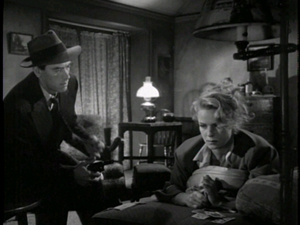
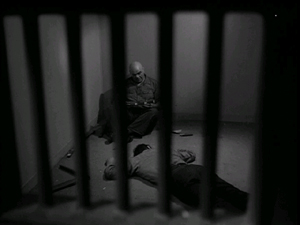
Railroaded; Behind Locked Doors
* Railroaded (74 min. - 1947): Anthony Mann made some of the most square-jawed film noirs in his time, and Railroaded is no different. Following a chain of events after the robbery of a bookie goes wrong, Railroaded is an interesting noir entry because it has a hidden message that too much cynicism could hurt otherwise good people. One of the crooks is fatally wounded, and the remaining hood, Duke (John Ireland, Red River), frames an innocent laundry truck driver named Steve (Ed Kelly). When straight-laced police detective Mickey Ferguson (Hugh Beaumont, better known as the father from "Leave it to Beaver") arrives to arrest Steve, he interrupts a family dinner where the sister, Rosie (Sheila Ryan, Caged Fury), is complaining that cops in movies are too rough on their suspects. This jaded opinion is only reinforced when her brother is hauled off to jail. Convinced that Ferguson is just trying to get a conviction without worrying whether it's right or wrong, Rosie decides to do her own sleuthing. She gets more than she bargained for, when the ruthless Duke sets his sights on her, as does the lovelorn Ferguson.
Though the plot is fairly standard, Mann's blunt edges always make for engaging noir. Ireland's Duke is one bad customer, and he'd rather see everyone dead than get sent up the river himself. He brings a menacing presence to the film, keeping the viewer on edge wondering what drastic action he'll take next. Mann also choreographs a fantastic shoot-out in a darkened nightclub, making use of the deep shadows and discombobulating camera angles that are the essence of the genre.
* Behind Locked Doors (62 min. - 1948): This short feature directed by Oscar "Budd" Boetticher (The Cimarron Kid) doesn't spend any time fooling around. Airtight and quickly paced, Behind Locked Doors is a private detective story set inside a high-priced sanitarium. Prefiguring Sam Fuller's Shock Corridor by fifteen years, rookie shamus Ross Stewart (Richard Carlson, It Came From Outer Space) is enlisted by enterprising newspaper woman Kathy Lawrence (Lucille Bremer, Meet Me in St. Louis) to check himself into the loony bin. She has a lead that a corrupt judge (Herbert Heyes, Park Row) is hiding there to avoid arrest. Once inside, Stewart is instantly in over his head. Between the patients and the quirks of their conditions and a sadistic orderly (Douglas Fowley), it's not as easy to get around the hospital as he would have thought. In particular, he can't make his way into the locked ward, which houses violent patients like the Champ, played by Tor Johnson from Plan 9 From Outer Space.
Writers Malvin Wald (The Naked City) and Eugene Ling (Shock) have every piece in place. While there are moments of strained credibility, they know exactly what they need to bring Behind Locked Doors to a harried climax. Every element of the hospital has been put there for a purpose, and it's a lot of fun to watch it all come together in a violent rush.
***
All in all, a solid grouping of films. Kino's transfers aren't always the best, but Film Noir - The Dark Side of Hollywood is put together with some essential crime pictures that might otherwise fall by the wayside. This new box does little more than wrap them up in a bundle, but in a more affordable way than previously available.
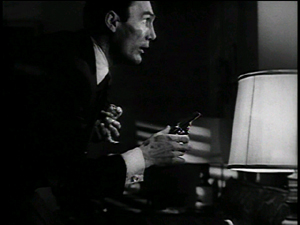
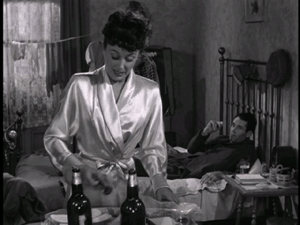
Sudden Fear; The Long Night
THE DVD
Video:
All five movies are full frame with less than satisfying picture quality. In all cases, the image is generally clear, with decent values on the blacks and the whites that make it easy to tell what is what; however, there are lots of scratches on the prints. Of the five, Behind Locked Doors is probably the best. Sudden Fear probably has the least surface dirt, but the picture has a soft focus and there are more skips than in the other movies.
Sound:
This varies from movie to movie. None of them receive any notable remixing, but some have aged better than others. Behind Locked Doors had no issues, for instance, while Railroaded had a lot of background hiss. During chapter 5 of The Long Night, the sound drops at the chapter shift, signaled by an audible pop. The volume gets lower, and the dialogue sounds like it was moved to the back of the mix. Once it changes over to chapter 6, the levels come back up. Hangmen Also Die has a similar glitch at the very end of the movie, as the oppressed sing in chorus over a final montage of the city. The music sounds tinny and obscured by static, almost like the choir was singing into a giant fan.
Just as its picture is muffled, so is the sound on Sudden Fear. The levels are really low, and everyone sounds like they are far away.
Extras:
Most of the DVDs don't have any extras. Though they have a chapter selection menu, when you put the discs in, they load right up and play the movie. There are no added accoutrements exclusive to the Dark Side of Hollywood box, no booklet or anything else.
The one exception is The Long Night. There are two clips from the original Carné feature Le Jour se lève with links to the corresponding scene in the remake. The influence of the look of Carné's film is further explored in an interactive essay about the production design on The Long Night. An informative text piece is illustrated with photos, sketches, and small clips from The Long Night, explaining the elaborate use of painted backdrops, rear projection, models, and original sets to create Joe Adams' town. Finally, there is a gallery with production stills and promotional materials.
FINAL THOUGHTS:
Highly Recommended. Film Noir - The Dark Side of Hollywood is a great value. All of the films are exceptional, and though Hangmen Also Die strays a bit from what is normally considered noir, all five fit well together. The only downside is that the DVD transfers are all several years old and for the cream of this crop, particularly The Long Night and Hangmen, far below what the work deserves. I'd have found a higher price point acceptable if it meant better discs, but at the end of the day, having mid-grade copies of these movies for a good price is better than nothing at all. A quality film can always win out over a mediocre presentation.
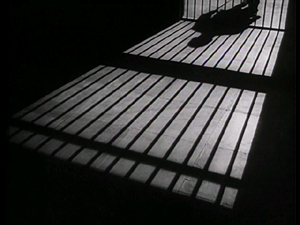
Hangmen Also Die
Jamie S. Rich is a novelist and comic book writer. He is best known for his collaborations with Joelle Jones, including the hardboiled crime comic book You Have Killed Me, the challenging romance 12 Reasons Why I Love Her, and the 2007 prose novel Have You Seen the Horizon Lately?, for which Jones did the cover. All three were published by Oni Press. His most recent projects include the futuristic romance A Boy and a Girl with Natalie Nourigat; Archer Coe and the Thousand Natural Shocks, a loopy crime tale drawn by Dan Christensen; and the horror miniseries Madame Frankenstein, a collaboration with Megan Levens. Follow Rich's blog at Confessions123.com.
|
| Popular Reviews |
| Sponsored Links |
|
|
| Sponsored Links |
|
|
| Release List | Reviews | Shop | Newsletter | Forum | DVD Giveaways | Blu-Ray | Advertise |
|
Copyright 2024 DVDTalk.com All Rights Reserved. Legal Info, Privacy Policy, Terms of Use,
Manage Preferences,
Your Privacy Choices | |||||||









